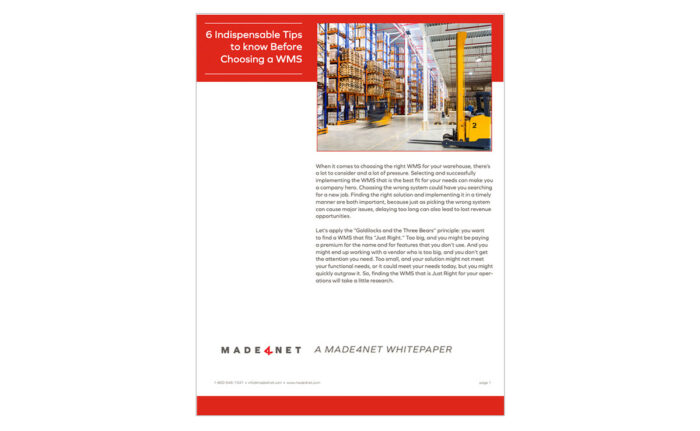
Shopping for key infrastructure software like a Warehouse Management System (WMS) can be incredibly stressful. It’s a big decision that can have a major impact on your warehouse management. Here, you’ll learn about some things small to mid-sized businesses might want to look for in a WMS to help you nail down your choice of the best warehouse management system for small and mid-sized business.
What Does a Warehouse Management System Do?
A warehouse management system helps manage a warehouse (or other types of distribution operations), just like it sounds. It manages processes, people, inventory and equipment to streamline processes, reduce errors, increase productivity, provide more reliable inventory availability and cut supply chain costs.
At their core, most Warehouse Management Systems have a few main functions, typically including:
- Receiving, putaway, picking and shipping goods
- Real-time inventory management
- Data collection and analysis
- Labor management
- Orchestrating systems, equipment and automation
Things Small to Mid-sized Businesses Should Look for in a WMS
When thinking about how to choose a warehouse management system that will fit the needs of your business, consider the following.
1. Ease of Use
Regardless of the size of the business, a WMS that’s going to complicate day-to-day work is unappealing. Ideally, a system has a simple user interface that doesn’t disrupt employees’ workdays.
Even better, systems that are easy to use are generally easy to train associates to use. A WMS that’s straightforward to use is likely to result in fewer operator errors, as well. This keeps tech staff from being over-burdened trying to fix mistakes.
2. Quick and Easy to Deploy
Software deployment can be a chore. It can take a long time to test, train, install and go live. If you’re shopping for a new WMS, you probably don’t want to wait six months, a year, or even longer to get it up and running and generating ROI.
A WMS that makes implementation and configuration to your specific business needs a breeze is ideal for small to medium companies. Ideally, the software company provides help with implementation to speed up the process and get your tech team up to date. Since many stakeholders say that lack of tech talent is one of the biggest barriers to the adoption of new technology, this ease of deployment is an important point.
3. Scalability
In one survey conducted by Guidant Financial, 51% of small business owners (defined as under 500 employees) hoped to grow their business in 2021 despite the challenges presented by the pandemic. If, like the majority of businesses, a company is looking to grow, they’d do well to implement a WMS that can grow with them.
Not every WMS on the market is scalable. Some of them are strictly built to accommodate a certain amount of business. Business owners and other stakeholders should make sure they choose one that can flex and expand with their growing operations.
4. Depth of Functionality
What good is a WMS if it doesn’t do all the things a company needs it to do? A great WMS for small and medium businesses should have robust inventory management features, the ability to create, assign, and track all work that’s necessary for operations, and collect data so companies can make more strategic decisions down the line.
Alongside the functionality of the core product, systems that offer seamless integrations or add-ons for other key supply chain functions are ideal. Examples of add-ons include labor management, yard management, and digital proof of delivery.
For more details on the types of features to look for, check out our blog on the misconceptions around the types of warehouse management systems.
5. Budget-Friendly
Not so long ago, logistics software solutions were prohibitively expensive for smaller businesses, presenting a huge barrier to adoption. Without the technology, it was difficult for small businesses to grow.
In today’s world full of SaaS WMS programs, that budget barrier has been removed. There are many subscription-based, budget-friendly options on the market for all your logistics needs.
Wondering if a new WMS will be worth the investment for your company? Check out Made4net’s ROI calculator. Reach out to the team at Made4net to learn about how our WarehouseExpert™ WMS is designed to work for small and medium businesses.
If you’re a high-growth operations, you may also like our tips for choosing the best enterprise WMS.


